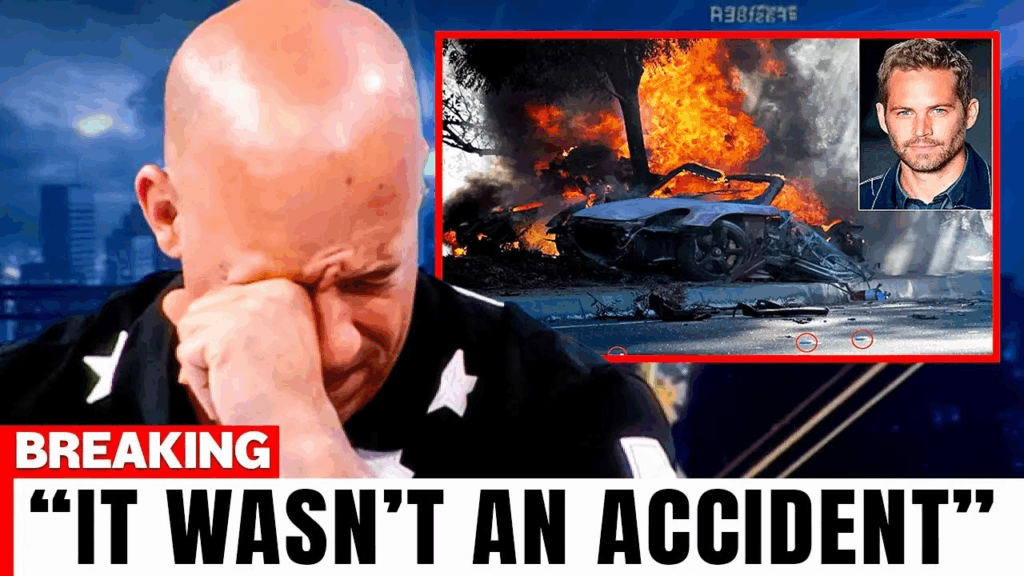At 56 years old, the man who has lived at full throttle both on screen and off has finally stopped running. Vin Diesel, Hollywood’s action icon, beloved leader of the Fast & Furious family, and one of the most recognizable figures in modern cinema, stunned fans worldwide with a candid confession that cut through years of speculation, tabloid rumors, and whispered assumptions. For more than two decades, audiences have seen him as the indestructible hero, the gravel-voiced face of speed, loyalty, and adrenaline. But in his revelation, Diesel stripped away that armor, replacing spectacle with sincerity. His words were not about cars, stunts, or fame—they were about his humanity, his struggles, and the truth that millions had long suspected but never heard from him directly.
The revelation came not on a red carpet, not during the promotion of another blockbuster, but in the quiet intimacy of a long-form interview taped inside his own Los Angeles home. The room was humble: no flashy cars in the background, no staged props—just Diesel, dressed in a plain black T-shirt, sitting across from a journalist he has known since the earliest days of his career. His voice, usually booming and commanding, trembled as he began to speak. The tension was palpable. For years, fans had speculated about his battles—whether with health, family trauma, or the relentless pressure of carrying a billion-dollar franchise. And then, almost in a whisper, he admitted: “I’ve been afraid to tell people who I really am. I thought the world only wanted the unbreakable Vin Diesel. But I’m not unbreakable. I never was.”
The statement hung in the air like smoke after an explosion. Here was a man whose image had been crafted around invincibility finally admitting to vulnerability. It was not just a confession—it was liberation. For decades, Diesel had been synonymous with hyper-masculine strength, a Hollywood brand built on horsepower and brotherhood. Yet behind the scenes, he had carried a different reality, one that many had suspected but few dared to voice aloud: the weight of insecurity, the pressure of expectations, and the emotional scars of a difficult past.

To understand why this confession resonates so deeply, one has to trace Diesel’s journey. Born Mark Sinclair in Alameda County, California, and raised in New York City, he never had the polished entry into Hollywood that others enjoyed. His early life was marked by uncertainty. Raised by a single mother and struggling to find his identity, Diesel turned to performance as both escape and survival. At 17, he was already working as a nightclub bouncer in Manhattan, learning to mask fear with toughness. It was a mask that would later serve him on the big screen—but one that came at a cost.

The cost, as he explained in his revelation, was silence. Silence about his battles with self-doubt. Silence about the moments when he felt crushed by the very image that made him a star. “There were nights,” he admitted, his eyes wet, “when I would come home from shooting scenes where I was supposed to be the strongest man in the world, and I would feel like the weakest one. I’d look in the mirror and wonder if I was living a lie.”
For fans, this was the moment of truth they had suspected for years. The whispers about Vin Diesel’s struggles were not just gossip—they were real. In his early career, when he famously produced his short film Multi-Facial about a struggling biracial actor, insiders noticed the story mirrored his own identity struggles. He was a man constantly trying to reconcile who he really was with who the industry wanted him to be. As the Fast & Furious franchise exploded into global dominance, that gap widened. He became a symbol, not just an actor. And symbols are not allowed to be fragile.
But the human being beneath the symbol always remained. Those who had worked closest with him—castmates like Michelle Rodriguez and the late Paul Walker—often hinted at the gentler, more sensitive Vin, the one who felt things deeply, sometimes too deeply. “Paul used to remind me to breathe,” Diesel said quietly. “He knew I was always carrying more than I showed. He knew.”
The loss of Paul Walker in 2013 was, by Diesel’s own admission, the breaking point. He confessed in this new revelation that for years he had never fully recovered from Walker’s death, that every film since has been shadowed by grief. “People saw me smiling on set, being strong for the family,” he explained. “But inside, I was broken. Every time I stepped into a car, I thought of him. Every scene about brotherhood reminded me of what I had lost. And I didn’t allow myself to heal, because I thought the world expected me to keep going.”
Fans had long suspected that Walker’s death changed Diesel in profound ways. His admission confirmed it. But it went further. For the first time, Diesel opened up about his battle with anxiety—something almost unimaginable for the fearless persona he played on screen. “I used to think anxiety was weakness,” he said. “So I buried it. But the truth is, I’ve lived with it all my life. The pressure, the fear of not being enough, the fear of losing the people I love—it’s all been there. I just never said it out loud.”
In saying it now, at 56, Diesel joined a growing list of public figures who have chosen to confront mental health stigma head-on. For his millions of fans, this was not a disappointment but a relief. They had long admired his characters for their toughness, but many admired the man even more for admitting that toughness often hides wounds. Social media lit up within hours of the interview’s release, with hashtags like #VinDieselTruth and #WeStandWithVin trending worldwide.
The emotional impact of his confession extended beyond fans. Mental health advocates praised his honesty, calling it a watershed moment for men in the entertainment industry. “For someone like Vin Diesel to stand up and say, ‘I have struggled too,’ is incredibly powerful,” said one leading psychologist. “It challenges the destructive idea that masculinity means silence.”
Diesel himself seemed lighter as he spoke, as though lifting a weight that had been pressing on his chest for decades. He admitted he does not know how fans will see him now, but he hopes they see not just the movie star, but the man who fought through insecurities, grief, and self-doubt, and chose to live authentically. “I’m 56 years old,” he said with a half-smile. “It took me this long to stop hiding. But I’d rather spend the rest of my life being real than spend another year pretending.”
The irony is not lost on anyone: Diesel’s most famous line from the Fast & Furious saga is about family. For years, fans assumed that line was just Hollywood marketing. But now, his confession reframes it. Family, both on and off screen, has been his anchor, his salvation, and his greatest vulnerability. “I’ve always told people that nothing is stronger than family,” he said. “But I never admitted that I clung to those words because I was afraid of losing mine. Paul’s death showed me how fragile it all is. That’s the truth I never said out loud—until now.”
The admission has already reshaped his legacy. Diesel will still be remembered for his blockbuster stunts and gravel-voiced monologues, but now, he will also be remembered for his courage to be vulnerable. His confession echoes a universal truth: that no one, no matter how strong they appear, is immune to doubt, grief, or pain. In sharing his story, Diesel has turned what fans suspected into a beacon of solidarity.
As the interview concluded, he looked directly into the camera, his voice steady but soft: “If you’ve ever felt like you had to pretend to be stronger than you are, I want you to know you’re not alone. I’ve been there. And it’s okay to tell the truth.”
For millions watching, that line was more powerful than any movie explosion. It was not just Vin Diesel’s truth—it was a mirror held up to all who have carried silent battles. And in that moment, the unbreakable action hero did something truly heroic: he showed that vulnerability is not weakness. It is strength.
The confession marks not an ending but a new chapter. At 56, Vin Diesel has finally let go of the myth and embraced the man. And in doing so, he has given the world a story more gripping than any blockbuster—his own.



